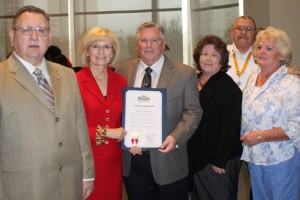Commissioner Murman mentioned and quoted in this Times article:
By Bill Varian, Times Staff Writer
In Print: Thursday, February 23, 2012
TAMPA — It was supposed to be a day in which they celebrated their newfound collegiality.
But it ended in a fracas, with commissioners accusing each other of trickery, grandstanding and campaigning from the dais.
It started with a discussion about commissioner paychecks.
Commissioner Kevin Beckner proposed that board members make a symbolic gesture: Pledge to cut their own pay if county employees are ever asked again to take a pay hit. But after making his case several times, he failed to muster a second.
Commissioners earn about $92,000 a year. The chair earns an additional $10,000 stipend.
Commissioner Sandra Murman offered a separate proposal to let commissioners cut their salaries if they so choose, which a recent state law and the county’s charter already allow. Chairman Ken Hagan seconded that idea.
The acrimony began when Commissioner Al Higginbotham, who had been on a bathroom break, returned to say he would support Beckner’s original proposal. But Hagan and Commissioner Les Miller had the board’s parliamentarian confirm that, underRobert’s Rules of Order, neither Beckner nor Higginbotham could put forward the original motion since it had already died.
“Parliamentary trickery at its finest,” Beckner said.
“It’s not parliamentary trickery,” Miller shot back. “It’s following the rules.”
The two proceeded to talk over each other for a few tense moments, with Miller saying Beckner was trying to throw the rest of the commission under the bus to score political points.
Hagan, until that exchange, had made the case that commissioners have already shown leadership on the issue in the past. When Higginbotham floated a proposal three years ago for commissioners to accept a pay cut, Hagan noted that he came up with the idea to reduce board members’ auto allowance and accept other cutbacks instead.
As the Miller-Beckner melee wound down, Hagan boiled over.
“Please stop the campaign rhetoric,” he told Beckner.
In the preceding back and forth, Murman announced that she will soon volunteer to take a pay cut. After the meeting, she said it will be at least 3 percent, and she will ask that the money be directed to an initiative for the homeless she will pursue soon.
“I think a real leader is me saying I’m going to voluntarily take a reduction,” Murman said.
Reached later, Beckner accused Hagan of hijacking Higginbotham’s pay cut proposal from four years ago. And while he complimented Murman on her gesture, he said it was grandstanding to announce it at the meeting. Grandstanding is precisely what other board members say Beckner was doing.
Earlier in the day, commissioners spent several moments applauding an agreement reached by staff to jointly purchase $34.2 million worth of budget, finance and human resources software with the city of Tampa. They held the deal and unanimous vote up as symbolizing the new attitude at the county, one in which teamwork is emphasized over infighting.
Beckner’s proposal came at the end of the meeting. The vote was followed by the commission’s afternoon public comment period, which drew one speaker.
It was Largo resident Mark Klutho, an activist who regularly blasts commissioners on their failure to build and operate energy efficient buildings.
“You people are nothing but hot air,” he said. “You just repeat yourselves over and over and over again.”
In other action:
• A screening committee is recommending that commissioners hire a private sector auditor for the county’s vacant internal performance auditor position. Commissioners said they want to interview Kambam Reddi, director of enterprise policy at Rockwell Collins, a Cedar Rapids, Iowa, company that provides aviation and information technology systems to governments and aircraft manufacturers.
• Agreed to schedule a public hearing on a proposed new noise ordinance.
Bill Varian can be reached at (813) 226-3387 or varian@tampabay.com.
